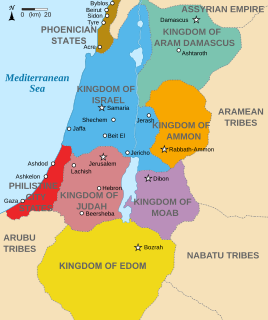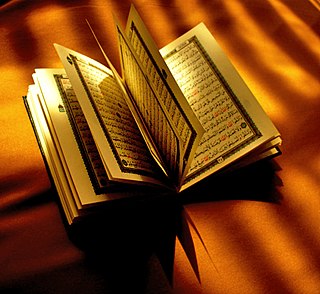
Aaron is a prophet, high priest, and the brother of Moses in the Abrahamic religions.

The Ark of the Covenant, also known as the Ark of the Testimony, is a gold-covered wooden chest with lid cover described in the Book of Exodus as containing the two stone tablets of the Ten Commandments. According to various texts within the Hebrew Bible, it also contained Aaron's rod and a pot of manna. Hebrews 9:4 describes: "The ark of the covenant [was] covered on all sides with gold, in which was a golden jar holding the manna, and Aaron's rod which budded, and the tablets of the covenant."

The Book of Joshua is the sixth book in the Hebrew Bible and the first book of the Deuteronomistic history, the story of Israel from the conquest of Canaan to the Babylonian exile. It tells of the campaigns of the Israelites in central, southern and northern Canaan, the destruction of their enemies, and the division of the land among the Twelve Tribes, framed by two set-piece speeches, the first by God commanding the conquest of the land, and, at the end, the last by Joshua warning of the need for faithful observance of the Law (torah) revealed to Moses.

Abarim is a mountain range across Jordan, to the east and south-east of the Dead Sea, extending from Mount Nebo — its highest point — in the north, perhaps to the Arabian desert in the south.

Bashan is a term for the northernmost region of the Transjordan. The Hebrew Bible first mentions it in Numbers 21:33, where Og the king of Bashan came out against the Israelites at the time of their entrance into the Promised Land, but was utterly routed. Along with the half of Gilead it was given to the half-tribe of Manasseh. According to the book of Joshua, Golan, one of its cities, became a Levitical city and a city of refuge.
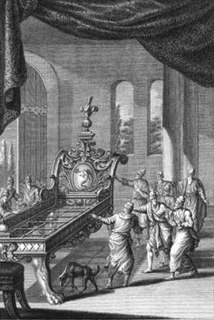
Og according to the Hebrew Bible, was an Amorite king of Bashan who, along with his army, was slain by Moses and his men at the battle of Edrei. In Arabic literature he is referred to as ‘Uj ibn Anaq.
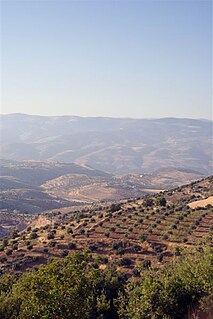
Gilead or Gilad is the name of three people and two geographic places in the Bible. Gilead may mean hill of testimony. If this the case, it is likely derived from gal‛êd, which in turn comes from gal and ‛êd. There also exists an alternative theory that it means rocky region. It is now within the Kingdom of Jordan.
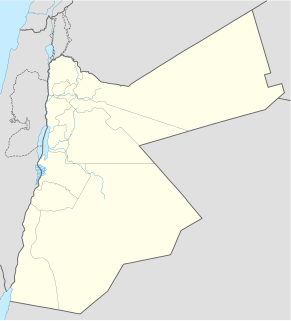
Heshbon was an ancient town located east of the Jordan River in what is now the Kingdom of Jordan, historically within the territories of ancient Ammon. Today, it is a ruin, bearing its old Arabic namesake, Tell Ḥesbān, located ca. 9 kilometers (5.6 mi) north of Madaba.

Mount Gerizim is one of the two mountains in the immediate vicinity of the West Bank city of Nablus, and forms the southern side of the valley in which Nablus is situated, the northern side being formed by Mount Ebal. The mountain is one of the highest peaks in the West Bank and rises to 881 m (2,890 ft) above sea level, 70 m (230 ft) lower than Mount Ebal. In Samaritan tradition, Mount Gerizim is held to be the highest, oldest and most central mountain in the world. The mountain is particularly steep on the northern side, is sparsely covered at the top with shrubbery, and lower down there is a spring with a high yield of fresh water.

V'Zot HaBerachah, VeZos HaBerachah, VeZot Haberakha, V'Zeis Habrocho, V'Zaus Haberocho, V'Zois Haberuchu, or Zos Habrocho is the 54th and final weekly Torah portion in the annual Jewish cycle of Torah reading and the 11th and last in the Book of Deuteronomy. It constitutes Deuteronomy 33:1–34:12. The parashah sets out the farewell Blessing of Moses for the 12 Tribes of Israel and concludes with the death of Moses.
Mt. Pisgah is a peak located in northeastern Pennsylvania's Glaciated Low Plateau region, also known as the Endless Mountains. The mountain peak lies next to a state park named after the mountain, Mt. Pisgah State Park. There is a hiking trail to the summit that has a view of the surrounding countryside, 1,000 feet (305 m) feet below. Stephen Foster lake is also located at the base of the mountain.
"I've Been to the Mountaintop" is the popular name of the last speech delivered by Martin Luther King Jr.
The Transjordan is an area of land in the Southern Levant lying east of the Jordan River.
Transjordan, the East Bank, or the Transjordanian Highlands, is the part of the Southern Levant east of the Jordan River, mostly contained in present-day Jordan.
Mount Pisgah is a peak in Carbon County, Pennsylvania situated north-northwest from and looming over the right bank business district in downtown Jim Thorpe.






